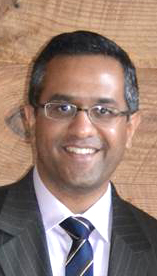As a medical student, do you ever wonder what it’s like to be a nephrologist? Here’s your chance to find out.
Meet Tejas Desai, MD, a nephrology specialist and featured physician in AMA Wire’s® “Shadow Me” Specialty Series, which offers advice directly from physicians about life in their specialties.
Read his insights to help determine whether a career in nephrology might be a good fit for you.
“Shadowing” Dr. Desai
Specialty: Nephrology
Practice setting: Academic
Years in practice: 6
A typical day in my practice:
I start my day by seeing clinic patients in the morning. I see anywhere between eight and 12 patients before noon. From noon to 1 p.m., we have an academic conference. This conference varies based on the day of the week, but we have journal club, case conference and research conference weekly. In the afternoon I see hospitalized patients with a fellow, resident and medical student. In a week I work approximately 50-60 hours, divided between the office and the hospital.
The most challenging and rewarding aspects of caring for patients in nephrology:
Research and development in kidney diseases is growing. This makes nephrology extremely exciting because I believe that the way I practice nephrology today will be dramatically different in the next 10-15 years. However, this also means that I am caring for patients today that need the drugs and therapies of tomorrow. These therapies are on the horizon, but they don’t exist yet for me to use in caring for my patients. This makes research and development of new therapies in kidney diseases both a rewarding and exciting part of my field and a challenge simultaneously.
Three adjectives that describe the typical nephrology physician:
Logical. Excited. Professionally satisfied.
How my lifestyle matches or differs from what I envisioned in med school:
The lifestyle is actually better than what I envisioned in medical school. I never thought I’d be able to balance family obligations with clinical care and research. However, I’ve been very fortunate to have both personal and professional gratification.
One skill every physician in training should have for nephrology but won’t be tested for on the board exam:
The main skill is to think logically. Nephrology is very attractive to individuals who prefer logical thinking and deductive reasoning to rote memorization. Board exams are geared more toward testing memorization than logic and deduction.
Three books every medical student interested in nephrology should read:
- National Kidney Foundation’s Primer on Kidney Disease by Scott J. Gilbert, MD; Daniel E. Weiner, MD; Debbie S. Gipson, MD; Mark A. Perazella, MD; and Marcello Tonelli, MD
- The ICU Book by Paul L. Marino, MD, PhD
- The Handbook of Dialysis by John T. Daugirdas, MD; Peter G. Blake, MD; and Todd S. Ing, MBBS
Online resources students interested in my specialty should follow:
- AJKD Blog
- The International Society of Nephrology
- National Kidney Foundation
- Nephrology On-Demand
- UKidney
A quick insight I’d give students who are considering nephrology:
Try to find a mentor in the field as early as you can. It’s really important to have guidance as you approach graduation from medical school and enter residency. A great mentor is invaluable.
If I had a mantra or song to describe my life in this specialty, it’d be:
“If you fail, never give up because F.A.I.L. means First Attempt In Learning” by APJ Abdul Kalam
Want to learn more about your specialty options?
- Read more profiles in AMA Wire’s "Shadow Me" Specialty Series to learn additional insights from physicians in such specialties as otolaryngology, vascular surgery, infectious disease, adolescent medicine and physical medicine and rehabilitation, among others.
- Check out the FREIDA Specialty Guide.
- Be sure to avoid these 5 common mistakes students make when choosing a specialty.




